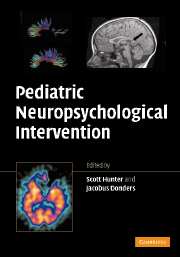Book contents
- Frontmatter
- Contents
- List of Contributors
- Section I Fundamentals of pediatric neuropsychological intervention
- 1 Introduction
- 2 A developmental approach to pediatric neuropsychological intervention
- 3 Empirical bases for assessment and intervention
- 4 Multicultural aspects of pediatric neuropsychological intervention and rehabilitation
- 5 Bridging neuropsychological practice with educational intervention
- Section II Managing neurocognitive impairments in children and adolescents
- Section III Medical, rehabilitative and experimental interventions
- Section IV Future directions
- Index
- Plate section
- References
1 - Introduction
Published online by Cambridge University Press: 13 August 2009
- Frontmatter
- Contents
- List of Contributors
- Section I Fundamentals of pediatric neuropsychological intervention
- 1 Introduction
- 2 A developmental approach to pediatric neuropsychological intervention
- 3 Empirical bases for assessment and intervention
- 4 Multicultural aspects of pediatric neuropsychological intervention and rehabilitation
- 5 Bridging neuropsychological practice with educational intervention
- Section II Managing neurocognitive impairments in children and adolescents
- Section III Medical, rehabilitative and experimental interventions
- Section IV Future directions
- Index
- Plate section
- References
Summary
Pediatric neuropsychology is the science and practice of understanding and elucidating brain-behavior relationships as applied to children and adolescents. This specialty has advanced significantly in a relatively short period of time. Once merely a downward extension of general adult-based neuropsychology, the assessment of complex neurocognitive and behavioral difficulties in children and adolescents has become a comprehensive, independent arena of practice and research in its own right. This has been reflected in several recent published works about common neuropsychological disorders in children and adolescents (Dewey & Tupper, 2004; Yeates, Ris & Taylor, 2000) and comprehensive norms for assessment instruments that can be applied with such persons (Baron, 2004). However, with few exceptions (Farmer, Donders & Warschausky, 2006), there is a dearth of comprehensive reviews of methods of intervention from a pediatric neuropsychological perspective.
The move from diagnosis to recommendations is one still fraught with uncertainty for many practitioners. We live in a time when we are able to make use of many sophisticated approaches to diagnosis, but there are increasing demands for interventions for which there is firm empirical evidence as to their efficacy and cost-effectiveness. Research-informed data concerning the most appropriate and efficacious interventions for childhood neuropsychological disorders is scarce. Given this situation, the primary purpose of this volume is to help practitioners and clinical researchers better identify and understand the empirical evidence that is available that supports various interventions with a range of congenital or acquired neuropsychological disorders in children and adolescents.
- Type
- Chapter
- Information
- Pediatric Neuropsychological Intervention , pp. 3 - 5Publisher: Cambridge University PressPrint publication year: 2007



